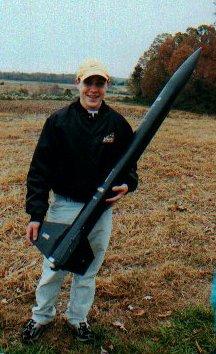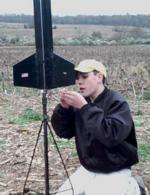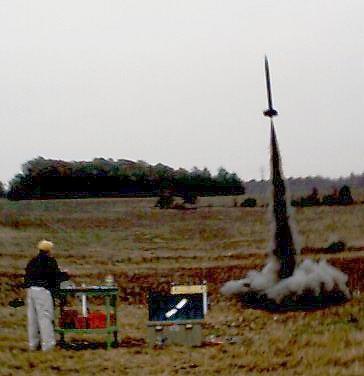Brief:
 The Night Hawk is an awesome (yet simple) 7x29mm cluster rocket made by THOY. I received this rocket as a Christmas present a few years back. It has very easy construction, and can fly on about any combination of 1, 2, 3, 4, 5, 6, or 7 29mm motors.
The Night Hawk is an awesome (yet simple) 7x29mm cluster rocket made by THOY. I received this rocket as a Christmas present a few years back. It has very easy construction, and can fly on about any combination of 1, 2, 3, 4, 5, 6, or 7 29mm motors.
Construction:
The rocket came in a plastic bag with (1) long 3.9" airframe tube, (1) short 3.9" payload tube, (2) centering rings, (7) 29mm motor tubes (3 long, 4 short), (3) plywood fins, a steel cable shock cord mount, a 36" fluorescent orange 'chute, a 1" wide black elastic shock cord, an ACE 3.9" nose cone, a 3.9" booster/payload coupler, a 1/2" launch lug, and a plywood bulkhead with an eye hook for shock cord attachment. The airframe tubing was thick paper (like LOC tubing), and all of the parts were undamaged, and of good quality.
The kit had standard construction, and went together smoothly. The only problem I had in construction was installing the fins. The rocket has through-the-wall fin mounting, and each fin tab is intended to slip through the slot in the body tube, and fit between two of the seven motor tubes. When I did this, the fins did not go in all of the way, and therefore left a nasty gap along the fin root. I solved the problem by filling the gap with putty, but I do not know if I aligned the tubes incorrectly, or if the tabs were cut too long. Either way, the rocket still went together very well, and looked very nice. It is quite large, too, (about 5 feet tall) so it stands out.
Finishing:
In the year between construction and the first flight of this rocket, it went through three different paint schemes. I finally ended up with an all black body, with U.S. Air Force decals on it. I painted it with sanded grey primer, and Krylon spray paint. I also made 1 other change on the rocket. I replaced the 1/2" launch lug with 2 1/4" launch lugs, and covered up the nasty, hard to sand putty on the fin roots with epoxied on strips of construction paper. Hey... I know it sounds cheap, but it worked!
Construction Rating: 4 out of 5
 Flight:
Flight:
The first flight of the Night Hawk was at the ROCC (Rocketry Of Central Carolina) November, 2000 launch. I chose to fly it on a three-in-line cluster of (1) G38-4FJ, and (2) F23-4FJs (a 206NS H94-4FJ equivalent). The motors were friction fitted into place, and I then ran into the problem of not having good low current igniters. So... I consulted some people, and I ended up with some igniters called "Firestarter" (not Firestar) igniters. The man that donated them said they were pretty good- especially when he first used them. He said he had had some misfires lately with them. Despite this, I took them, and loaded them into the rocket, and wired them in parallel. Then, 5...4...3...2...1... LIFTOFF! All three motors lit, and the rocket ROARED off of the the pad on an awesome column of black smoke.
 Recovery:
Recovery:
The rocket ejected at apogee, but the 'chute was a bit too small, and it descended a little too fast for my liking. It cracked one of the fin roots on landing. So... I then took on the adventure of glassing the booster (main) section of the rocket, the fins, and the fin roots. The process was messy, but it came out all right for my first try at it. I then had to refinish the rocket. So, I filled the glass with vinyl spackling, and put a wrap of clear lamination sticker on the payload to make it all smooth and pretty. Then, the rocket was once again primed, sanded, and painted. I painted it just gloss black this time, and put no decals on it (but I will someday soon :-) Lastly, to slow down recovery speed, I left the 36" 'chute on the main body, but attached two smaller chutes to the payload, so that each section could descend slowly, and separately. I also attached rail guides, and threw out the old 1/4" lugs. Now it was time for flight two. The motors of choice here were (2) F50-4Ts, and (1) RMS F52-5T reload (a 240NS H146T). This time around, I made sure I got good igniters, so I ordered some Trailing Edge Technologies Fire-in-the-Hole low current tungsten igniters. The second flight was at the ROCC April 2001 launch. The new igniters worked to perfection, and the Night Hawk roared off of the rail into the sky on a light trail of Blue Thunder smoke with a little blue flame at ignition (I had to look hard, though). The separate recovery worked perfectly here, and the rocket only suffered some paint chipping. The flight was great.
Flight Rating: 3 out of 5
Summary:
PROS: The Night Hawk looks sharp, is easy to build, and flies great on about any motor combination you can think of... but make sure you build it strongly! CONS: The chute is a bit too small, you must make sure you line the motor tube gaps with the fin slots, and the flight cost is going to be more than single motor flights.
Overall Rating: 4 out of 5
 |
 |
Sponsored Ads
 |
 |












tom mullen (March 16, 2016)
i know this is rather older review, but wanted to comment. i had a nighthawk and it was my favorite of my fleet. i sold it, and a lot of my fleet and supplies about 2 years ago, but am a BAR!!! currently working on scratch building a nighthawk. it was an awesome rocket with many awesome flights.